Searched: Christian
News
The champion of “native missions” trained more than 100,000 evangelists but got in trouble for financial mismanagement.
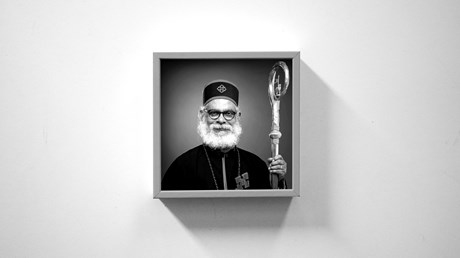 Athanasius Yohannan, who built one of the world’s largest mission organizations on the idea that Western Christians should support “native missionaries” but got in trouble for financial irregularities and dishonest fundraising, died on May 8. He was 74 and got hit by a car while walking along the road near his ministry headquarters in Texas.Born Kadapilaril Punnoose Yohannan and known for most of his ministry as K. P., Yohannan founded Gospel for Asia in 1979. Over the next 45 years, the organization trained more than 100,000 people to preach the gospel and plant and pastor churches in India, Bangladesh, Nepal, Sri Lanka, and other places in Southeast Asia, according to a recent ministry report. Gospel for Asia raised as much as $93 million in a year and in 2005 reported it was supporting about 14,500 indigenous evangelists and pastors in same-culture and near-culture ministry. Christians in the US were asked to give $30 per month to support them.“If we evangelize the world’s lost billions … it will be through native missions,” Yohannan wrote for CT. “The native missionary is far more effective than the expatriate. The national already knows the language and is already part of the culture. In many instances, he or she can go places where outsiders cannot go.”Yohannan’s death was mourned by Gospel for Asia, the church that he started and served as metropolitan bishop, and prominent political leaders in India.“He will be remembered for his service to society and emphasis on improving the quality of life of the downtrodden,” Prime Minister Narendra Modi wrote on social media. “May his soul rest in peace.”Both the governor of Kerala and the ...Continue reading... Athanasius Yohannan, who built one of the world’s largest mission organizations on the idea that Western Christians should support “native missionaries” but got in trouble for financial irregularities and dishonest fundraising, died on May 8. He was 74 and got hit by a car while walking along the road near his ministry headquarters in Texas.Born Kadapilaril Punnoose Yohannan and known for most of his ministry as K. P., Yohannan founded Gospel for Asia in 1979. Over the next 45 years, the organization trained more than 100,000 people to preach the gospel and plant and pastor churches in India, Bangladesh, Nepal, Sri Lanka, and other places in Southeast Asia, according to a recent ministry report. Gospel for Asia raised as much as $93 million in a year and in 2005 reported it was supporting about 14,500 indigenous evangelists and pastors in same-culture and near-culture ministry. Christians in the US were asked to give $30 per month to support them.“If we evangelize the world’s lost billions … it will be through native missions,” Yohannan wrote for CT. “The native missionary is far more effective than the expatriate. The national already knows the language and is already part of the culture. In many instances, he or she can go places where outsiders cannot go.”Yohannan’s death was mourned by Gospel for Asia, the church that he started and served as metropolitan bishop, and prominent political leaders in India.“He will be remembered for his service to society and emphasis on improving the quality of life of the downtrodden,” Prime Minister Narendra Modi wrote on social media. “May his soul rest in peace.”Both the governor of Kerala and the ...Continue reading... |
The Uniform Civil Code seeks “one nation, one law” to govern citizens' personal lives, but religious minorities fear hidden costs.
 In February, the northern Indian state of Uttarakhand passed a Uniform Civil Code (UCC), which aims to implement a common set of rules governing crucial aspects of life, including marriage, divorce, inheritance, and adoption.This code would supplant existing personal laws that religious groups in India currently ascribe to. Personal laws cover family-related matters such as marriage, divorce, child custody, adoption, property rights, and inheritance.If the ruling Hindu-led Bharatiya Janata Party (BJP) has its way, a UCC will eventually be implemented across all of India. (At present, Goa is the only other state with a UCC, derived from the Portuguese-era Civil Code of 1867.)The BJP’s push to implement a national UCC may bring relief for Christians in India, especially in terms of women’s inheritance rights. Under existing personal laws, Christian mothers cannot inherit their deceased children’s property. The UCC proposes to eliminate discriminatory provisions that favor male inheritance, potentially leading to more equitable inheritance rights for Christian women.But few of India’s religious minorities trust the BJP, whose policies have often been more harmful than helpful to Christian communities. In Assam, Christian leaders protested the passing of a bill banning “magical healing” as it unfairly impacted their custom of praying for the sick. Ministries including World Vision and the Evangelical Fellowship of India recently lost government authorization to collect foreign donations. Nine states now have anti-conversion laws in place, and believers have borne the brunt of religious unrest in these areas as a result.As this year’s general elections seem likely ...Continue reading... In February, the northern Indian state of Uttarakhand passed a Uniform Civil Code (UCC), which aims to implement a common set of rules governing crucial aspects of life, including marriage, divorce, inheritance, and adoption.This code would supplant existing personal laws that religious groups in India currently ascribe to. Personal laws cover family-related matters such as marriage, divorce, child custody, adoption, property rights, and inheritance.If the ruling Hindu-led Bharatiya Janata Party (BJP) has its way, a UCC will eventually be implemented across all of India. (At present, Goa is the only other state with a UCC, derived from the Portuguese-era Civil Code of 1867.)The BJP’s push to implement a national UCC may bring relief for Christians in India, especially in terms of women’s inheritance rights. Under existing personal laws, Christian mothers cannot inherit their deceased children’s property. The UCC proposes to eliminate discriminatory provisions that favor male inheritance, potentially leading to more equitable inheritance rights for Christian women.But few of India’s religious minorities trust the BJP, whose policies have often been more harmful than helpful to Christian communities. In Assam, Christian leaders protested the passing of a bill banning “magical healing” as it unfairly impacted their custom of praying for the sick. Ministries including World Vision and the Evangelical Fellowship of India recently lost government authorization to collect foreign donations. Nine states now have anti-conversion laws in place, and believers have borne the brunt of religious unrest in these areas as a result.As this year’s general elections seem likely ...Continue reading... |
Matthew Warner, who had tweeted about gay marriage, is the latest in a string of Christian college faculty who have lost their jobs after being accused of theological misalignment.
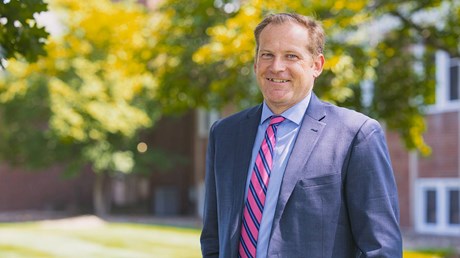 With glowing performance reviews and above-average student evaluations, by most measures Matthew Warner’s first year as a communications professor at Grace College was a triumph.But he spent most of that first year knowing it could be his last. After four months on the job, Warner was informed by the school’s president, Drew Flamm, that the board had “come to the conclusion that we don’t think it works out to move forward,” according to a recording obtained by Religion News Service.Warner’s termination is the latest in a string of professor terminations at Christian colleges seemingly tied to clashes over narrowing and often unspoken political and theological criteria.While Flamm didn’t specify the reasons for Warner’s dismissal, it was preceded by an online termination campaign clear about its goals. Launched by conservative influencers and Grace College stakeholders, the campaign demanded Warner’s removal due to his social media posts about LGBTQ rights, Black Lives Matter, and critiques of the GOP. Almost all the posts predated Warner’s employment at the college.Grace College declined to answer questions about Warner, saying it was a personnel matter. “Dr. Matt Warner fulfilled his agreement for the year. Grace College wishes Dr. Warner well in his future endeavors,” Norm Bakhit, Grace College’s chief officer of human resources, told RNS in a statement. Flamm did not offer further comment.Warner and his wife said they both left behind jobs and sold their home in metro Detroit to move with their three kids to Warsaw, Indiana, for Warner’s job at Grace. It was his dream position, they said, and noted that they gave up 60 percent of their ...Continue reading... With glowing performance reviews and above-average student evaluations, by most measures Matthew Warner’s first year as a communications professor at Grace College was a triumph.But he spent most of that first year knowing it could be his last. After four months on the job, Warner was informed by the school’s president, Drew Flamm, that the board had “come to the conclusion that we don’t think it works out to move forward,” according to a recording obtained by Religion News Service.Warner’s termination is the latest in a string of professor terminations at Christian colleges seemingly tied to clashes over narrowing and often unspoken political and theological criteria.While Flamm didn’t specify the reasons for Warner’s dismissal, it was preceded by an online termination campaign clear about its goals. Launched by conservative influencers and Grace College stakeholders, the campaign demanded Warner’s removal due to his social media posts about LGBTQ rights, Black Lives Matter, and critiques of the GOP. Almost all the posts predated Warner’s employment at the college.Grace College declined to answer questions about Warner, saying it was a personnel matter. “Dr. Matt Warner fulfilled his agreement for the year. Grace College wishes Dr. Warner well in his future endeavors,” Norm Bakhit, Grace College’s chief officer of human resources, told RNS in a statement. Flamm did not offer further comment.Warner and his wife said they both left behind jobs and sold their home in metro Detroit to move with their three kids to Warsaw, Indiana, for Warner’s job at Grace. It was his dream position, they said, and noted that they gave up 60 percent of their ...Continue reading... |
From 1978 to 2008, he fought for legal recognition and freedom to worship for the Anabaptist denomination.
 Nguyen Quang Trung spent 30 years trying to get the Mennonite church recognized and registered by the government of Vietnam so that believers could meet and worship legally. When he finally succeeded, he celebrated the triumph with the words of the apostle Paul: “If we live, we live for the Lord; and if we die, we die for the Lord. So, whether we live or die, we belong to the Lord” (Rom. 14:8).Nguyen, a pastor and two-time president of Hội Thánh Mennonite Việt Nam (Vietnam Mennonite Church), died on March 23 at age 84. He was known for his “patient persistence” and “tireless efforts to promote and legally confirm a Mennonite presence in Vietnam,” Gerry Keener, former head of Eastern Mennonite Missions, told Anabaptist World.Nguyen was born in Gia Dinh, an industrial area outside Saigon. His mother died when he was five. His father was a committed Christian who raised him in the Evangelical Church of Vietnam, part of the Christian and Missionary Alliance.In his 20s, Nguyen found himself drawn to the Mennonites, spending a lot of time in a reading room established by the Eastern Mennonite Board of Missions and Charities. He took classes on English and the Bible and learned the Anabaptist teachings about nonviolence.“The same Spirit that empowered Jesus also empowers us to love enemies,” the missionaries taught Nguyen, “to forgive rather than to seek revenge, to practice right relationships, to rely on the community of faith to settle disputes, and to resist evil without violence.”Nguyen embraced the idea that Christians should “follow Christ in the way of peace” and practice “nonresistance,” even if they faced persecution and death.The ...Continue reading... Nguyen Quang Trung spent 30 years trying to get the Mennonite church recognized and registered by the government of Vietnam so that believers could meet and worship legally. When he finally succeeded, he celebrated the triumph with the words of the apostle Paul: “If we live, we live for the Lord; and if we die, we die for the Lord. So, whether we live or die, we belong to the Lord” (Rom. 14:8).Nguyen, a pastor and two-time president of Hội Thánh Mennonite Việt Nam (Vietnam Mennonite Church), died on March 23 at age 84. He was known for his “patient persistence” and “tireless efforts to promote and legally confirm a Mennonite presence in Vietnam,” Gerry Keener, former head of Eastern Mennonite Missions, told Anabaptist World.Nguyen was born in Gia Dinh, an industrial area outside Saigon. His mother died when he was five. His father was a committed Christian who raised him in the Evangelical Church of Vietnam, part of the Christian and Missionary Alliance.In his 20s, Nguyen found himself drawn to the Mennonites, spending a lot of time in a reading room established by the Eastern Mennonite Board of Missions and Charities. He took classes on English and the Bible and learned the Anabaptist teachings about nonviolence.“The same Spirit that empowered Jesus also empowers us to love enemies,” the missionaries taught Nguyen, “to forgive rather than to seek revenge, to practice right relationships, to rely on the community of faith to settle disputes, and to resist evil without violence.”Nguyen embraced the idea that Christians should “follow Christ in the way of peace” and practice “nonresistance,” even if they faced persecution and death.The ...Continue reading... |
Federal prosecutors are trying to prove that Bill Hwang committed massive market manipulation through his investment firm Archegos. His defense says he was trading like anyone else on Wall Street.
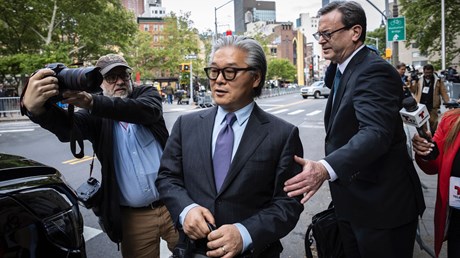 Bill Hwang brought a book by Dietrich Bonhoeffer to court to read during jury selection.And during opening arguments on Monday, his Christian connections from New York packed out a courtroom to support him.He had given his investment firm a Christian name, held Wall Street Bible readings, and distributed millions to evangelical charities.But federal prosecutors at Hwang’s highly anticipated criminal trial are accusing the billionaire of being a mob boss mastermind rather than a humble evangelical investor following his convictions.Hwang has been charged with tens of billions of dollars’ worth of securities fraud. In a packed courtroom in lower Manhattan on Monday, the prosecution claimed his investment firm Archegos Capital Management was an “organized criminal enterprise,” like a mob operation. Hwang faces decades in prison.The blockbuster trial is expected to last eight weeks and will include witnesses from the Christian world in New York. Andy Mills, the former president of The King’s College, who also served as CEO of Archegos and as chairman of Hwang’s foundation, will testify for the defense.Hwang and his wife, Becky Hwang, are the sole backers of the $528 million Grace and Mercy Foundation, which supports ministries in New York and around the world.Many of Hwang’s former employees at Archegos are Christians—like Jensen Ko, who, after the collapse of Archegos, started a new investment fund called AriseN. And Archegos was named for a Greek word used to describe Christ as the “author” of our salvation (Heb. 2:10) and the “prince” of life (Acts 3:15).Archegos fell apart in March 2021. It bought up massive positions in a few companies using borrowed ...Continue reading... Bill Hwang brought a book by Dietrich Bonhoeffer to court to read during jury selection.And during opening arguments on Monday, his Christian connections from New York packed out a courtroom to support him.He had given his investment firm a Christian name, held Wall Street Bible readings, and distributed millions to evangelical charities.But federal prosecutors at Hwang’s highly anticipated criminal trial are accusing the billionaire of being a mob boss mastermind rather than a humble evangelical investor following his convictions.Hwang has been charged with tens of billions of dollars’ worth of securities fraud. In a packed courtroom in lower Manhattan on Monday, the prosecution claimed his investment firm Archegos Capital Management was an “organized criminal enterprise,” like a mob operation. Hwang faces decades in prison.The blockbuster trial is expected to last eight weeks and will include witnesses from the Christian world in New York. Andy Mills, the former president of The King’s College, who also served as CEO of Archegos and as chairman of Hwang’s foundation, will testify for the defense.Hwang and his wife, Becky Hwang, are the sole backers of the $528 million Grace and Mercy Foundation, which supports ministries in New York and around the world.Many of Hwang’s former employees at Archegos are Christians—like Jensen Ko, who, after the collapse of Archegos, started a new investment fund called AriseN. And Archegos was named for a Greek word used to describe Christ as the “author” of our salvation (Heb. 2:10) and the “prince” of life (Acts 3:15).Archegos fell apart in March 2021. It bought up massive positions in a few companies using borrowed ...Continue reading... |
 In a significant legal victory, a Family Court in Pakistan has annulled the forced marriage of Reeha Saleem, a Christian girl abducted in 2019 on her way home from school. The court ruled that the marriage to her Muslim neighbor, under which she was coerced into converting to Islam, was not valid. In a significant legal victory, a Family Court in Pakistan has annulled the forced marriage of Reeha Saleem, a Christian girl abducted in 2019 on her way home from school. The court ruled that the marriage to her Muslim neighbor, under which she was coerced into converting to Islam, was not valid. |
Federal prosecutors are trying to prove that Bill Hwang committed massive market manipulation through his investment firm Archegos. His defense says he was trading like anyone else on Wall Street.
 Bill Hwang brought a book by Dietrich Bonhoeffer to court to read during jury selection.And during opening arguments on Monday, his Christian connections from New York packed out a courtroom to support him.He had given his investment firm a Christian name, held Wall Street Bible readings, and distributed millions to evangelical charities.But federal prosecutors at Hwang’s highly anticipated criminal trial are accusing the billionaire of being a mob boss mastermind rather than a humble evangelical investor following his convictions.Hwang has been charged with tens of billions of dollars’ worth of securities fraud. In a packed courtroom in lower Manhattan on Monday, the prosecution claimed his investment firm Archegos Capital Management was an “organized criminal enterprise,” like a mob operation. Hwang faces decades in prison.The blockbuster trial is expected to last eight weeks and will include witnesses from the Christian world in New York. Andy Mills, the former president of The King’s College, who also served as CEO of Archegos and as chairman of Hwang’s foundation, will testify for the defense.Hwang and his wife, Becky Hwang, are the sole backers of the $528 million Grace and Mercy Foundation, which supports ministries in New York and around the world.Many of Hwang’s former employees at Archegos are Christians—like Jensen Ko, who, after the collapse of Archegos, started a new investment fund called AriseN. And Archegos was named for a Greek word used to describe Christ as the “author” of our salvation (Heb. 2:10) and the “prince” of life (Acts 3:15).Archegos fell apart in March 2021. It bought up massive positions in a few companies using borrowed ...Continue reading... Bill Hwang brought a book by Dietrich Bonhoeffer to court to read during jury selection.And during opening arguments on Monday, his Christian connections from New York packed out a courtroom to support him.He had given his investment firm a Christian name, held Wall Street Bible readings, and distributed millions to evangelical charities.But federal prosecutors at Hwang’s highly anticipated criminal trial are accusing the billionaire of being a mob boss mastermind rather than a humble evangelical investor following his convictions.Hwang has been charged with tens of billions of dollars’ worth of securities fraud. In a packed courtroom in lower Manhattan on Monday, the prosecution claimed his investment firm Archegos Capital Management was an “organized criminal enterprise,” like a mob operation. Hwang faces decades in prison.The blockbuster trial is expected to last eight weeks and will include witnesses from the Christian world in New York. Andy Mills, the former president of The King’s College, who also served as CEO of Archegos and as chairman of Hwang’s foundation, will testify for the defense.Hwang and his wife, Becky Hwang, are the sole backers of the $528 million Grace and Mercy Foundation, which supports ministries in New York and around the world.Many of Hwang’s former employees at Archegos are Christians—like Jensen Ko, who, after the collapse of Archegos, started a new investment fund called AriseN. And Archegos was named for a Greek word used to describe Christ as the “author” of our salvation (Heb. 2:10) and the “prince” of life (Acts 3:15).Archegos fell apart in March 2021. It bought up massive positions in a few companies using borrowed ...Continue reading... |
From 1978 to 2008, he fought for legal recognition and freedom to worship for the Anabaptist denomination.
 Nguyen Quang Trung spent 30 years trying to get the Mennonite church recognized and registered by the government of Vietnam so that believers could meet and worship legally. When he finally succeeded, he celebrated the triumph with the words of the apostle Paul: “If we live, we live for the Lord; and if we die, we die for the Lord. So, whether we live or die, we belong to the Lord” (Rom. 14:8).Nguyen, a pastor and two-time president of Hội Thánh Mennonite Việt Nam (Vietnam Mennonite Church), died on March 23 at age 84. He was known for his “patient persistence” and “tireless efforts to promote and legally confirm a Mennonite presence in Vietnam,” Gerry Keener, former head of Eastern Mennonite Missions, told Anabaptist World.Nguyen was born in Gia Dinh, an industrial area outside Saigon. His mother died when he was five. His father was a committed Christian who raised him in the Evangelical Church of Vietnam, part of the Christian and Missionary Alliance.In his 20s, Nguyen found himself drawn to the Mennonites, spending a lot of time in a reading room established by the Eastern Mennonite Board of Missions and Charities. He took classes on English and the Bible and learned the Anabaptist teachings about nonviolence.“The same Spirit that empowered Jesus also empowers us to love enemies,” the missionaries taught Nguyen, “to forgive rather than to seek revenge, to practice right relationships, to rely on the community of faith to settle disputes, and to resist evil without violence.”Nguyen embraced the idea that Christians should “follow Christ in the way of peace” and practice “nonresistance,” even if they faced persecution and death.The ...Continue reading... Nguyen Quang Trung spent 30 years trying to get the Mennonite church recognized and registered by the government of Vietnam so that believers could meet and worship legally. When he finally succeeded, he celebrated the triumph with the words of the apostle Paul: “If we live, we live for the Lord; and if we die, we die for the Lord. So, whether we live or die, we belong to the Lord” (Rom. 14:8).Nguyen, a pastor and two-time president of Hội Thánh Mennonite Việt Nam (Vietnam Mennonite Church), died on March 23 at age 84. He was known for his “patient persistence” and “tireless efforts to promote and legally confirm a Mennonite presence in Vietnam,” Gerry Keener, former head of Eastern Mennonite Missions, told Anabaptist World.Nguyen was born in Gia Dinh, an industrial area outside Saigon. His mother died when he was five. His father was a committed Christian who raised him in the Evangelical Church of Vietnam, part of the Christian and Missionary Alliance.In his 20s, Nguyen found himself drawn to the Mennonites, spending a lot of time in a reading room established by the Eastern Mennonite Board of Missions and Charities. He took classes on English and the Bible and learned the Anabaptist teachings about nonviolence.“The same Spirit that empowered Jesus also empowers us to love enemies,” the missionaries taught Nguyen, “to forgive rather than to seek revenge, to practice right relationships, to rely on the community of faith to settle disputes, and to resist evil without violence.”Nguyen embraced the idea that Christians should “follow Christ in the way of peace” and practice “nonresistance,” even if they faced persecution and death.The ...Continue reading... |
The Uniform Civil Code seeks “one nation, one law” to govern citizens' personal lives, but religious minorities fear hidden costs.
 In February, the northern Indian state of Uttarakhand passed a Uniform Civil Code (UCC), which aims to implement a common set of rules governing crucial aspects of life, including marriage, divorce, inheritance, and adoption.This code would supplant existing personal laws that religious groups in India currently ascribe to. Personal laws cover family-related matters such as marriage, divorce, child custody, adoption, property rights, and inheritance.If the ruling Hindu-led Bharatiya Janata Party (BJP) has its way, a UCC will eventually be implemented across all of India. (At present, Goa is the only other state with a UCC, derived from the Portuguese-era Civil Code of 1867.)The BJP’s push to implement a national UCC may bring relief for Christians in India, especially in terms of women’s inheritance rights. Under existing personal laws, Christian mothers cannot inherit their deceased children’s property. The UCC proposes to eliminate discriminatory provisions that favor male inheritance, potentially leading to more equitable inheritance rights for Christian women.But few of India’s religious minorities trust the BJP, whose policies have often been more harmful than helpful to Christian communities. In Assam, Christian leaders protested the passing of a bill banning “magical healing” as it unfairly impacted their custom of praying for the sick. Ministries including World Vision and the Evangelical Fellowship of India recently lost government authorization to collect foreign donations. Nine states now have anti-conversion laws in place, and believers have borne the brunt of religious unrest in these areas as a result.As this year’s general elections seem likely ...Continue reading... In February, the northern Indian state of Uttarakhand passed a Uniform Civil Code (UCC), which aims to implement a common set of rules governing crucial aspects of life, including marriage, divorce, inheritance, and adoption.This code would supplant existing personal laws that religious groups in India currently ascribe to. Personal laws cover family-related matters such as marriage, divorce, child custody, adoption, property rights, and inheritance.If the ruling Hindu-led Bharatiya Janata Party (BJP) has its way, a UCC will eventually be implemented across all of India. (At present, Goa is the only other state with a UCC, derived from the Portuguese-era Civil Code of 1867.)The BJP’s push to implement a national UCC may bring relief for Christians in India, especially in terms of women’s inheritance rights. Under existing personal laws, Christian mothers cannot inherit their deceased children’s property. The UCC proposes to eliminate discriminatory provisions that favor male inheritance, potentially leading to more equitable inheritance rights for Christian women.But few of India’s religious minorities trust the BJP, whose policies have often been more harmful than helpful to Christian communities. In Assam, Christian leaders protested the passing of a bill banning “magical healing” as it unfairly impacted their custom of praying for the sick. Ministries including World Vision and the Evangelical Fellowship of India recently lost government authorization to collect foreign donations. Nine states now have anti-conversion laws in place, and believers have borne the brunt of religious unrest in these areas as a result.As this year’s general elections seem likely ...Continue reading... |
The Uniform Civil Code seeks "one nation, one law" to govern citizens' personal lives, but religious minorities fear hidden costs.
|
A first cohort of scholars consider whether God is calling them to executive leadership.
 Ted Song wears many hats.He is the chief innovation and intercultural engagement officer at John Brown University and the head of the engineering department at the evangelical school in Northwest Arkansas. He’s a dad to three daughters, an elder and college minister at his church, and a student earning a law degree to learn more about the rules and regulations governing higher education.Song also has his eye on another potential hat.Last year, he joined the first cohort of presidential fellows at the Council for Christian Colleges and Universities (CCCU), exploring a call to lead an evangelical school.“If presidency is God’s calling, great,” Song said. “If God wants to use a person as a president of a Christian college, great. But that can also happen in the classroom or on an athletic field. I want to remind myself and also remind my students that we always need to go back to our mission.”Song is one of three evangelical academics who have joined the CCCU’s yearlong program to prepare for the possibility of becoming a Christian college president. The other two members of the inaugural group are Keith Hall, vice president for student belonging at Azusa Pacific University, and Sarah Visser, executive vice president for student experience and strategy at Calvin University.“Each one of these fellows is outstanding,” said Shirley Hoogstra, president of the CCCU. “There’s always turnover in senior leadership, and we want to make sure that we are equipping groups of people to be available for those positions … to be ready in the event that a call comes from God to move into the next level of leadership.”The presidential training program launched in ...Continue reading... Ted Song wears many hats.He is the chief innovation and intercultural engagement officer at John Brown University and the head of the engineering department at the evangelical school in Northwest Arkansas. He’s a dad to three daughters, an elder and college minister at his church, and a student earning a law degree to learn more about the rules and regulations governing higher education.Song also has his eye on another potential hat.Last year, he joined the first cohort of presidential fellows at the Council for Christian Colleges and Universities (CCCU), exploring a call to lead an evangelical school.“If presidency is God’s calling, great,” Song said. “If God wants to use a person as a president of a Christian college, great. But that can also happen in the classroom or on an athletic field. I want to remind myself and also remind my students that we always need to go back to our mission.”Song is one of three evangelical academics who have joined the CCCU’s yearlong program to prepare for the possibility of becoming a Christian college president. The other two members of the inaugural group are Keith Hall, vice president for student belonging at Azusa Pacific University, and Sarah Visser, executive vice president for student experience and strategy at Calvin University.“Each one of these fellows is outstanding,” said Shirley Hoogstra, president of the CCCU. “There’s always turnover in senior leadership, and we want to make sure that we are equipping groups of people to be available for those positions … to be ready in the event that a call comes from God to move into the next level of leadership.”The presidential training program launched in ...Continue reading... |
 Practicing Christians and Scripture-engaged believers are more skeptical of artificial intelligence than the American public as a whole, according to a new survey.? Practicing Christians and Scripture-engaged believers are more skeptical of artificial intelligence than the American public as a whole, according to a new survey.? |
 A Christian woman reportedly suffered a stroke while in solitary confinement in Virginia after facing charges under the Freedom of Access to Clinic Entrances (FACE) Act for protesting at abortion clinics. A Christian woman reportedly suffered a stroke while in solitary confinement in Virginia after facing charges under the Freedom of Access to Clinic Entrances (FACE) Act for protesting at abortion clinics. |
It wasn't only because of missionaries from the West, says a Tongan Australian theologian.
 Christian overseas missionaries were more successful in Oceania—the region spanning the Pacific Islands, Australia, Papua New Guinea, and New Zealand—than anywhere else in the world.In particular, people in the Pacific Islands (which include Fiji, Papua New Guinea, Samoa, Vanuatu, Tonga, and more) were receptive to the gospel because “their ancestors’ strong beliefs in a divine presence and in the afterlife made them very open to Christian faith,” wrote Jacqueline Ryle, a contributor to the 2021 reference volume Christianity in Oceania. Tongan Australian theologian Katalina Tahaafe-Williams says her research reveals the same: The growth of Christianity in the region was not because of white Europeans but rather due to Indigenous missionaries who translated Christianity in a way that made sense to locals.Tahaafe-Williams, who lives in Sydney, served as the Indigenous coeditor for the book alongside prominent global Christianity scholars Kenneth R. Ross and Todd M. Johnson.“Our goal was to recruit Indigenous writers from all over the region to contribute to this volume,” she explained. “It was my task to connect with potential authors, theologians, leaders, and church members from the Pacific Islands … we were very committed to finding, however challenging it might be, authors who were part of that particular culture, thereby making the work very authentic.”CT Global books editor Geethanjali Tupps spoke with Tahaafe-Williams on why Christianity flourished in the Pacific Islands, how migration patterns have impacted the church, and why the region shouldn’t serve as the poster child for climate change issues.Continue reading... Christian overseas missionaries were more successful in Oceania—the region spanning the Pacific Islands, Australia, Papua New Guinea, and New Zealand—than anywhere else in the world.In particular, people in the Pacific Islands (which include Fiji, Papua New Guinea, Samoa, Vanuatu, Tonga, and more) were receptive to the gospel because “their ancestors’ strong beliefs in a divine presence and in the afterlife made them very open to Christian faith,” wrote Jacqueline Ryle, a contributor to the 2021 reference volume Christianity in Oceania. Tongan Australian theologian Katalina Tahaafe-Williams says her research reveals the same: The growth of Christianity in the region was not because of white Europeans but rather due to Indigenous missionaries who translated Christianity in a way that made sense to locals.Tahaafe-Williams, who lives in Sydney, served as the Indigenous coeditor for the book alongside prominent global Christianity scholars Kenneth R. Ross and Todd M. Johnson.“Our goal was to recruit Indigenous writers from all over the region to contribute to this volume,” she explained. “It was my task to connect with potential authors, theologians, leaders, and church members from the Pacific Islands … we were very committed to finding, however challenging it might be, authors who were part of that particular culture, thereby making the work very authentic.”CT Global books editor Geethanjali Tupps spoke with Tahaafe-Williams on why Christianity flourished in the Pacific Islands, how migration patterns have impacted the church, and why the region shouldn’t serve as the poster child for climate change issues.Continue reading... |
The Uniform Civil Code seeks "one nation, one law" to govern citizens' personal lives, but religious minorities fear hidden costs.
 In February, the northern Indian state of Uttarakhand passed a Uniform Civil Code (UCC), which aims to implement a common set of rules governing crucial aspects of life, including marriage, divorce, inheritance, and adoption.This code would supplant existing personal laws that religious groups in India currently ascribe to. Personal laws cover family-related matters such as marriage, divorce, child custody, adoption, property rights, and inheritance.If the ruling Hindu-led Bharatiya Janata Party (BJP) has its way, a UCC will eventually be implemented across all of India. (At present, Goa is the only other state with a UCC, derived from the Portuguese-era Civil Code of 1867.)The BJP’s push to implement a national UCC may bring relief for Christians in India, especially in terms of women’s inheritance rights. Under existing personal laws, Christian mothers cannot inherit their deceased children’s property. The UCC proposes to eliminate discriminatory provisions that favor male inheritance, potentially leading to more equitable inheritance rights for Christian women.But few of India’s religious minorities trust the BJP, whose policies have often been more harmful than helpful to Christian communities. In Assam, Christian leaders protested the passing of a bill banning “magical healing” as it unfairly impacted their custom of praying for the sick. Ministries including World Vision and the Evangelical Fellowship of India recently lost government authorization to collect foreign donations. Nine states now have anti-conversion laws in place, and believers have borne the brunt of religious unrest in these areas as a result.As this year’s general elections seem likely ...Continue reading... In February, the northern Indian state of Uttarakhand passed a Uniform Civil Code (UCC), which aims to implement a common set of rules governing crucial aspects of life, including marriage, divorce, inheritance, and adoption.This code would supplant existing personal laws that religious groups in India currently ascribe to. Personal laws cover family-related matters such as marriage, divorce, child custody, adoption, property rights, and inheritance.If the ruling Hindu-led Bharatiya Janata Party (BJP) has its way, a UCC will eventually be implemented across all of India. (At present, Goa is the only other state with a UCC, derived from the Portuguese-era Civil Code of 1867.)The BJP’s push to implement a national UCC may bring relief for Christians in India, especially in terms of women’s inheritance rights. Under existing personal laws, Christian mothers cannot inherit their deceased children’s property. The UCC proposes to eliminate discriminatory provisions that favor male inheritance, potentially leading to more equitable inheritance rights for Christian women.But few of India’s religious minorities trust the BJP, whose policies have often been more harmful than helpful to Christian communities. In Assam, Christian leaders protested the passing of a bill banning “magical healing” as it unfairly impacted their custom of praying for the sick. Ministries including World Vision and the Evangelical Fellowship of India recently lost government authorization to collect foreign donations. Nine states now have anti-conversion laws in place, and believers have borne the brunt of religious unrest in these areas as a result.As this year’s general elections seem likely ...Continue reading... |
A majority of American Protestants were raised by devout mothers, a study finds.
 The vast majority of American Christians were raised in the faith—and most can point to the influence of their moms.In a 2023 study, the American Bible Society found that a majority of believers remain in the same religious tradition as their mothers. This agrees with a large body of mainstream social science research dating back to the 1970s that says the active faith of mothers is a strong predictor of religious transmission.Some of this may be attributed to the natural bond children have with their mothers. But there is also research that shows that moms take a more active role in faith formation in America.A 2019 Barna Group survey found that Christian teenagers who say their faith is very important to them are 20 points more likely to talk to their moms about religion than their dads. More than 70 percent of Christian teenagers read the Bible, 70 percent talk about God, and 63 percent pray with their moms.Continue reading... The vast majority of American Christians were raised in the faith—and most can point to the influence of their moms.In a 2023 study, the American Bible Society found that a majority of believers remain in the same religious tradition as their mothers. This agrees with a large body of mainstream social science research dating back to the 1970s that says the active faith of mothers is a strong predictor of religious transmission.Some of this may be attributed to the natural bond children have with their mothers. But there is also research that shows that moms take a more active role in faith formation in America.A 2019 Barna Group survey found that Christian teenagers who say their faith is very important to them are 20 points more likely to talk to their moms about religion than their dads. More than 70 percent of Christian teenagers read the Bible, 70 percent talk about God, and 63 percent pray with their moms.Continue reading... |
FRC Board Chairman and Co-Chair of the Jerusalem Prayer Breakfast, Michele Bachmann, joined CBN's Faith Nation to share how the Christian community is uniting in prayer and stand in unwavering support for Israel on Sunday, May 19th by dedicating a portion of our worship services to pray for Israel's peace, prosperity, and protection.For more information, visit www.prayandstand.com...
|
The champion of “native missions” trained more than 100,000 evangelists but got in trouble for financial mismanagement.
 Athanasius Yohannan, who built one of the world’s largest mission organizations on the idea that Western Christians should support “native missionaries” but got in trouble for financial irregularities and dishonest fundraising, died on May 8. He was 74 and got hit by a car while walking along the road near his ministry headquarters in Texas.Born Kadapilaril Punnoose Yohannan and known for most of his ministry as K. P., Yohannan founded Gospel for Asia in 1979. Over the next 45 years, the organization trained more than 100,000 people to preach the gospel and plant and pastor churches in India, Bangladesh, Nepal, Sri Lanka, and other places in Southeast Asia, according to a recent ministry report. Gospel for Asia raised as much as $93 million in a year and in 2005 reported it was supporting about 14,500 indigenous evangelists and pastors in same-culture and near-culture ministry. Christians in the US were asked to give $30 per month to support them.“If we evangelize the world’s lost billions … it will be through native missions,” Yohannan wrote for CT. “The native missionary is far more effective than the expatriate. The national already knows the language and is already part of the culture. In many instances, he or she can go places where outsiders cannot go.”Yohannan’s death was mourned by Gospel for Asia, the church that he started and served as metropolitan bishop, and prominent political leaders in India.“He will be remembered for his service to society and emphasis on improving the quality of life of the downtrodden,” Prime Minister Narendra Modi wrote on social media. “May his soul rest in peace.”Both the governor of Kerala and the ...Continue reading... Athanasius Yohannan, who built one of the world’s largest mission organizations on the idea that Western Christians should support “native missionaries” but got in trouble for financial irregularities and dishonest fundraising, died on May 8. He was 74 and got hit by a car while walking along the road near his ministry headquarters in Texas.Born Kadapilaril Punnoose Yohannan and known for most of his ministry as K. P., Yohannan founded Gospel for Asia in 1979. Over the next 45 years, the organization trained more than 100,000 people to preach the gospel and plant and pastor churches in India, Bangladesh, Nepal, Sri Lanka, and other places in Southeast Asia, according to a recent ministry report. Gospel for Asia raised as much as $93 million in a year and in 2005 reported it was supporting about 14,500 indigenous evangelists and pastors in same-culture and near-culture ministry. Christians in the US were asked to give $30 per month to support them.“If we evangelize the world’s lost billions … it will be through native missions,” Yohannan wrote for CT. “The native missionary is far more effective than the expatriate. The national already knows the language and is already part of the culture. In many instances, he or she can go places where outsiders cannot go.”Yohannan’s death was mourned by Gospel for Asia, the church that he started and served as metropolitan bishop, and prominent political leaders in India.“He will be remembered for his service to society and emphasis on improving the quality of life of the downtrodden,” Prime Minister Narendra Modi wrote on social media. “May his soul rest in peace.”Both the governor of Kerala and the ...Continue reading... |
One of the founding leaders of Victory megachurch, he never stopped running to share the gospel.
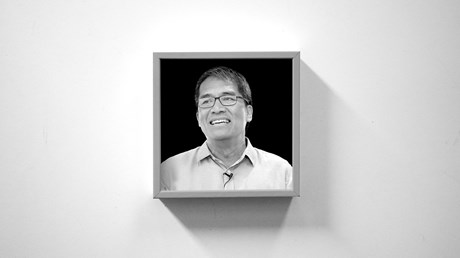 Ferdinand “Ferdie” Cabiling, a bishop at one of the Philippines’ largest megachurches who ran across the Philippines to raise money for disadvantaged students, died April 1, the day after Easter. He was 58 years old.Dubbed “the Running Pastor,” the moniker describes not only Cabiling’s epic race but how he lived his life and served as an evangelist. For 38 years, he was a vocational minister of Victory Christian Fellowship of the Philippines, which has nearly 150 locations in the country. The branch he led, Victory Metro Manila, averaged more than 75,000 people each Sunday. [Note: The author is a member of Victory Church and was a part of the late pastor's small group in 2014.]In the past two years, his focus was on teaching evangelism to Victory leaders. Every time he received a teaching invitation, his answer was always yes, said his assistant, Faye Bonifacio.“He was a maximizer,” Bonifacio said, noting that Cabiling developed a habit of taking short naps while parked at a gas station between long drives. “Because he liked to drive, he did a lot in a day.”Hours before his death, Cabiling had visited a church member at a hospital an hour away from his hometown of Cuyapo before parking his car at a gas station, likely for a break before heading to his next destination. It was there that an attendant found his lifeless body and rushed him to the hospital he had just visited. Cabiling had died of a heart attack.“He was a serious man of passion, action, and conviction,” wrote Steve Murrell, the founding pastor of Victory, the flagship church for the charismatic-leaning Every Nation Churches and Ministries, which has churches and campus ministries in ...Continue reading... Ferdinand “Ferdie” Cabiling, a bishop at one of the Philippines’ largest megachurches who ran across the Philippines to raise money for disadvantaged students, died April 1, the day after Easter. He was 58 years old.Dubbed “the Running Pastor,” the moniker describes not only Cabiling’s epic race but how he lived his life and served as an evangelist. For 38 years, he was a vocational minister of Victory Christian Fellowship of the Philippines, which has nearly 150 locations in the country. The branch he led, Victory Metro Manila, averaged more than 75,000 people each Sunday. [Note: The author is a member of Victory Church and was a part of the late pastor's small group in 2014.]In the past two years, his focus was on teaching evangelism to Victory leaders. Every time he received a teaching invitation, his answer was always yes, said his assistant, Faye Bonifacio.“He was a maximizer,” Bonifacio said, noting that Cabiling developed a habit of taking short naps while parked at a gas station between long drives. “Because he liked to drive, he did a lot in a day.”Hours before his death, Cabiling had visited a church member at a hospital an hour away from his hometown of Cuyapo before parking his car at a gas station, likely for a break before heading to his next destination. It was there that an attendant found his lifeless body and rushed him to the hospital he had just visited. Cabiling had died of a heart attack.“He was a serious man of passion, action, and conviction,” wrote Steve Murrell, the founding pastor of Victory, the flagship church for the charismatic-leaning Every Nation Churches and Ministries, which has churches and campus ministries in ...Continue reading... |
Matthew Warner, who had tweeted about gay marriage, is the latest in a string of Christian college faculty who have lost their jobs after being accused of theological misalignment.
 With glowing performance reviews and above-average student evaluations, by most measures Matthew Warner’s first year as a communications professor at Grace College was a triumph.But he spent most of that first year knowing it could be his last. After four months on the job, Warner was informed by the school’s president, Drew Flamm, that the board had “come to the conclusion that we don’t think it works out to move forward,” according to a recording obtained by Religion News Service.Warner’s termination is the latest in a string of professor terminations at Christian colleges seemingly tied to clashes over narrowing and often unspoken political and theological criteria.While Flamm didn’t specify the reasons for Warner’s dismissal, it was preceded by an online termination campaign clear about its goals. Launched by conservative influencers and Grace College stakeholders, the campaign demanded Warner’s removal due to his social media posts about LGBTQ rights, Black Lives Matter, and critiques of the GOP. Almost all the posts predated Warner’s employment at the college.Grace College declined to answer questions about Warner, saying it was a personnel matter. “Dr. Matt Warner fulfilled his agreement for the year. Grace College wishes Dr. Warner well in his future endeavors,” Norm Bakhit, Grace College’s chief officer of human resources, told RNS in a statement. Flamm did not offer further comment.Warner and his wife said they both left behind jobs and sold their home in metro Detroit to move with their three kids to Warsaw, Indiana, for Warner’s job at Grace. It was his dream position, they said, and noted that they gave up 60 percent of their ...Continue reading... With glowing performance reviews and above-average student evaluations, by most measures Matthew Warner’s first year as a communications professor at Grace College was a triumph.But he spent most of that first year knowing it could be his last. After four months on the job, Warner was informed by the school’s president, Drew Flamm, that the board had “come to the conclusion that we don’t think it works out to move forward,” according to a recording obtained by Religion News Service.Warner’s termination is the latest in a string of professor terminations at Christian colleges seemingly tied to clashes over narrowing and often unspoken political and theological criteria.While Flamm didn’t specify the reasons for Warner’s dismissal, it was preceded by an online termination campaign clear about its goals. Launched by conservative influencers and Grace College stakeholders, the campaign demanded Warner’s removal due to his social media posts about LGBTQ rights, Black Lives Matter, and critiques of the GOP. Almost all the posts predated Warner’s employment at the college.Grace College declined to answer questions about Warner, saying it was a personnel matter. “Dr. Matt Warner fulfilled his agreement for the year. Grace College wishes Dr. Warner well in his future endeavors,” Norm Bakhit, Grace College’s chief officer of human resources, told RNS in a statement. Flamm did not offer further comment.Warner and his wife said they both left behind jobs and sold their home in metro Detroit to move with their three kids to Warsaw, Indiana, for Warner’s job at Grace. It was his dream position, they said, and noted that they gave up 60 percent of their ...Continue reading... |
In the country's most secular state, tiny congregations have made a big impact by their disaster response.
 For weeks, Tárik Rodriguez had been working on bringing a guest preacher and worship leader from across the country to help his church celebrate its third anniversary. In 2021, Rodriguez and a small team launched Viela da Graça Igreja in Novo Hamburgo, a small city in Brazil’s most southern province, Rio Grande do Sul.Then, it started raining.The floods have done more than interrupt the small Reformed congregation’s celebratory plans. They’ve devastated the community. The storms that began at the end of April struck Rio Grande do Sul’s most densely populated areas and have killed at least 116 people. Around 130 people are still missing. The high water has closed roads and even the airport, which has grounded flights until May 30. As of Friday, May 10, nearly 400,000 people have been displaced from their homes and 70,772 are in public shelters.Some of those have found their way to Viela da Graça, which is located on higher ground and has been largely protected from a water breach. Since May 4, Rodriguez and members of the 75-person congregation have been hosting around 50 people in a two-bathroom, 3,500-square-foot building.“As Christians, we needed to open our doors,” Rodriguez says. “And that’s what we did.”Beyond the bathroom constraints, the situation has been less than ideal. There are frequent power cuts (1.2 million people have been affected by outages) and the building has lost access to both running and potable water because the sanitation company cannot treat the dirty floodwaters. A nearby residential condominium, which gets its water from a well, has provided drinking water and showers.Continue reading... For weeks, Tárik Rodriguez had been working on bringing a guest preacher and worship leader from across the country to help his church celebrate its third anniversary. In 2021, Rodriguez and a small team launched Viela da Graça Igreja in Novo Hamburgo, a small city in Brazil’s most southern province, Rio Grande do Sul.Then, it started raining.The floods have done more than interrupt the small Reformed congregation’s celebratory plans. They’ve devastated the community. The storms that began at the end of April struck Rio Grande do Sul’s most densely populated areas and have killed at least 116 people. Around 130 people are still missing. The high water has closed roads and even the airport, which has grounded flights until May 30. As of Friday, May 10, nearly 400,000 people have been displaced from their homes and 70,772 are in public shelters.Some of those have found their way to Viela da Graça, which is located on higher ground and has been largely protected from a water breach. Since May 4, Rodriguez and members of the 75-person congregation have been hosting around 50 people in a two-bathroom, 3,500-square-foot building.“As Christians, we needed to open our doors,” Rodriguez says. “And that’s what we did.”Beyond the bathroom constraints, the situation has been less than ideal. There are frequent power cuts (1.2 million people have been affected by outages) and the building has lost access to both running and potable water because the sanitation company cannot treat the dirty floodwaters. A nearby residential condominium, which gets its water from a well, has provided drinking water and showers.Continue reading... |
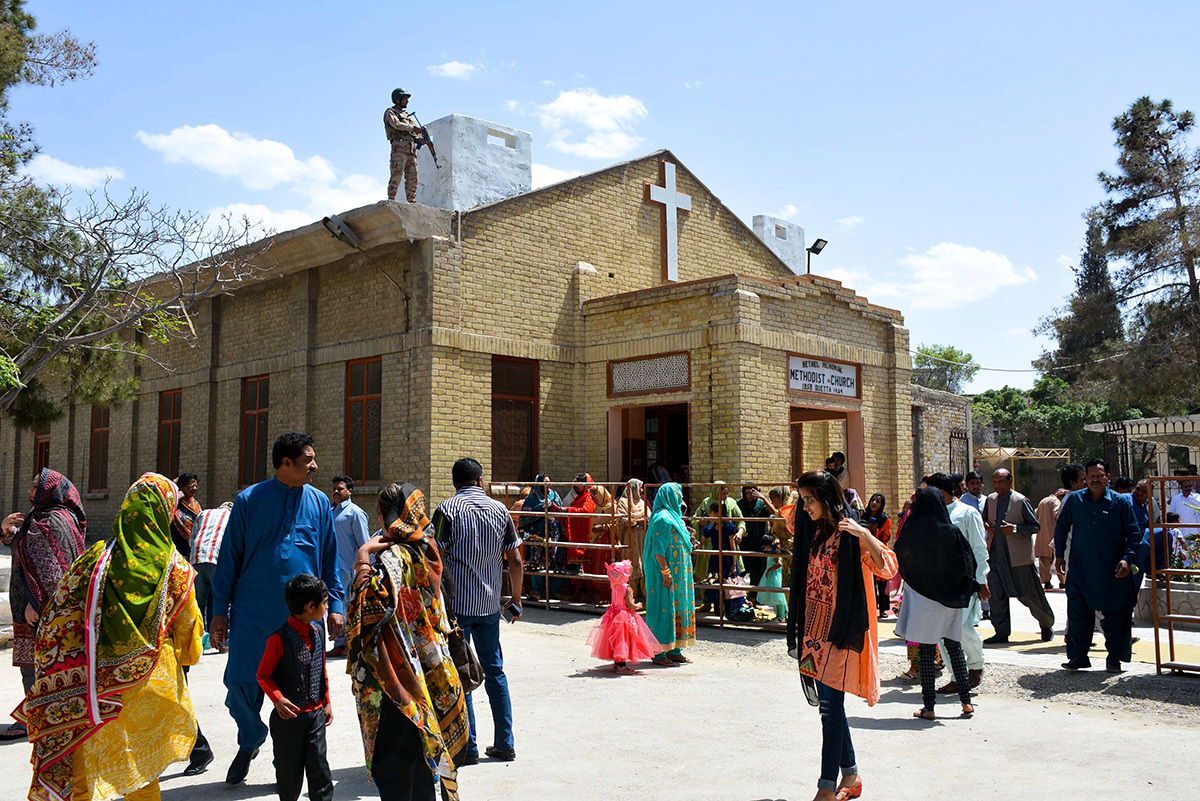 A Pakistani Christian forced to flee his home country due to blasphemy charges says he is facing renewed death threats and a bounty of nearly $500,000 after he expressed support for Israel online.? A Pakistani Christian forced to flee his home country due to blasphemy charges says he is facing renewed death threats and a bounty of nearly $500,000 after he expressed support for Israel online.? |
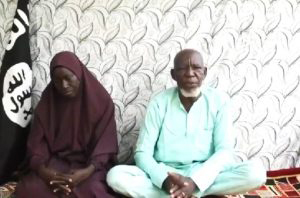 A video of a pastor and his wife kidnapped in March 2023 appeared on May 5 in which he pleaded for help from the government of Nigeria and Christian leaders. A video of a pastor and his wife kidnapped in March 2023 appeared on May 5 in which he pleaded for help from the government of Nigeria and Christian leaders. |
 Joshua Sutcliffe, who has been banned from his profession in the U.K. for allegedly misgendering a trans-identifying student, said that God has sustained him through his ordeal and that he remains hopeful. Joshua Sutcliffe, who has been banned from his profession in the U.K. for allegedly misgendering a trans-identifying student, said that God has sustained him through his ordeal and that he remains hopeful. |
In the country's most secular state, tiny congregations have made a big impact by their disaster response.
 For weeks, Tárik Rodriguez had been working on bringing a guest preacher and worship leader from across the country to help his church celebrate its third anniversary. In 2021, Rodriguez and a small team launched Viela da Graça Igreja in Novo Hamburgo, a small city in Brazil’s most southern province, Rio Grande do Sul.Then, it started raining.The floods have done more than interrupt the small Reformed congregation’s celebratory plans. They’ve devastated the community. The storms that began at the end of April struck Rio Grande do Sul’s most densely populated areas and have killed at least 116 people. Around 130 people are still missing. The high water has closed roads and even the airport, which has grounded flights until May 30. As of Friday, May 10, nearly 400,000 people have been displaced from their homes and 70,772 are in public shelters.Some of those have found their way to Viela da Graça, which is located on higher ground and has been largely protected from a water breach. Since May 4, Rodriguez and members of the 75-person congregation have been hosting around 50 people in a two-bathroom, 3,500-square-foot building.“As Christians, we needed to open our doors,” Rodriguez says. “And that’s what we did.”Beyond the bathroom constraints, the situation has been less than ideal. There are frequent power cuts (1.2 million people have been affected by outages) and the building has lost access to both running and potable water because the sanitation company cannot treat the dirty floodwaters. A nearby residential condominium, which gets its water from a well, has provided drinking water and showers.Continue reading... For weeks, Tárik Rodriguez had been working on bringing a guest preacher and worship leader from across the country to help his church celebrate its third anniversary. In 2021, Rodriguez and a small team launched Viela da Graça Igreja in Novo Hamburgo, a small city in Brazil’s most southern province, Rio Grande do Sul.Then, it started raining.The floods have done more than interrupt the small Reformed congregation’s celebratory plans. They’ve devastated the community. The storms that began at the end of April struck Rio Grande do Sul’s most densely populated areas and have killed at least 116 people. Around 130 people are still missing. The high water has closed roads and even the airport, which has grounded flights until May 30. As of Friday, May 10, nearly 400,000 people have been displaced from their homes and 70,772 are in public shelters.Some of those have found their way to Viela da Graça, which is located on higher ground and has been largely protected from a water breach. Since May 4, Rodriguez and members of the 75-person congregation have been hosting around 50 people in a two-bathroom, 3,500-square-foot building.“As Christians, we needed to open our doors,” Rodriguez says. “And that’s what we did.”Beyond the bathroom constraints, the situation has been less than ideal. There are frequent power cuts (1.2 million people have been affected by outages) and the building has lost access to both running and potable water because the sanitation company cannot treat the dirty floodwaters. A nearby residential condominium, which gets its water from a well, has provided drinking water and showers.Continue reading... |



 Links
Links  Articles
Articles  Blogs
Blogs  Videos
Videos  News
News  Colors
Colors 

 New links
New links

